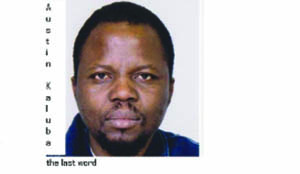 The identity crisis of Africans home and abroad is devastating since many fail to find their cultural forte ending up gravitating between what is ‘African’ and what they term to be ‘modern’ or even ‘English.’
The identity crisis of Africans home and abroad is devastating since many fail to find their cultural forte ending up gravitating between what is ‘African’ and what they term to be ‘modern’ or even ‘English.’
Unlike their Asian counterparts who have found their cultural niche in a western-influenced world, Africans despite inherently retaining certain African norms generally copy ‘things of the West.’
Sometime back, when I was studying in the United Kingdom (UK), I visited a friend in Manchester who had left Zambia 10 years earlier and has settled down in England where he works as a banker.
His wife, who is a nurse, joined him three years later.
But when I visited the couple, I was struck by the contrast between the attachment of the couple to Zambia.
While the wife spoke in a high-tonal nasal accent, the husband still speaks like any down-to-earth Zambian back home.
The woman went out of her way to show that England, and not Zambia, was her home (despite being in the country for a shorter period than her husband).
The man opened the door for me and greeted me in chi-Bemba, hugging me cordially.
Then I heard a female voice in the kitchen reprimanding someone.
‘Stop it! I said stop it! Stop being silly Lucy!”
As we settled down in the lounge, I saw a Pekinese dog trot in the room, its tail erect.
The woman followed it and lifted it up.
‘I have got you, silly thing.’
I realised who Lucy was. It was a dog!
The woman nodded a greeting in my direction but her husband reprimanded her in chi-Bemba. “Efyo uposha abantu ifyo (Is that the way you greet people)?”
The woman put the dog down and came over to shake my hands. After introductions, we sat down to chat.
“When did you leave ‘Zembia’?” she asked in a forced accent.
I nearly answered rudely that I did not know any country by that name but I had to be polite “Five years ago,” I replied. ‘I am told they have a new president Rupiah …Rupiah Benda…he…”
‘Mmh Bana mwana mulelanda kwati tamuli bena Zambia (my wife you are speaking as if you are not a Zambian)…who is they?” the husband cut in but she ignored him.
“You worked as a journalist. Write something about me. I want to stand as Member of Parliament for Kafue. Zambians need help. They need food.”
When I left the home late that evening, I started thinking about the types of Zambians who had migrated to Europe.
There is one group that is still loyal to the country and support most things Zambian.
This group usually attends the independence celebration day at the residence of the High Commissioner in London, might have a small Zambian flag in their homes or cars, and sometimes eat nshima and play Zambian music.
This group is also abreast with events back home through the Internet.
Then there is the type that is striving to be more British than Zambian by accommodating everything British and rejecting anything that links it with Zambia.
This group has people talking about the British Premier Theresa May like she is ‘their leader’.
This group has people who never speak any vernacular language in their homes.
The last major group is in between encompassing both British and Zambian values. Surprisingly, the second group, which is de-Zambianised, comprises largely people who have lived overseas only for a few years.
It is also surprising to hear the number of people who want to bring change when they come back home as Members of Parliament.
These are the people who write in the tabloids as ‘worried Zambians’ or ‘concerned Zambians’.
To them, Zambia is some remote, backward society whose solutions are in the hands of people in the West.
Like the Western journalist, these home-grown armchair critics feel they have solutions affecting ‘Zambia’ that locals cannot solve.
These are the ‘discontented’ and ‘resentful’ ‘Zambians’ who identify themselves as English rather than Zambian and are more likely to be Zamsceptic.
Most of them, who live in England, believe being Zambian is a ‘bad thing’, with most of them saying they would not come back to a backward society since Britain is their new home.
While some people living in European countries like England have a strong sense of dual identity, they are also increasingly saying they are British rather than Zambian.
With the dual citizenship proposed by the Government, there is nothing wrong with having a citizen of two countries.
However, one should never forget his roots.






